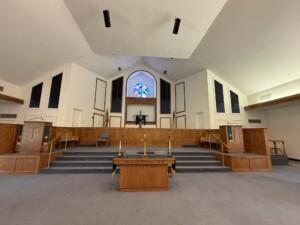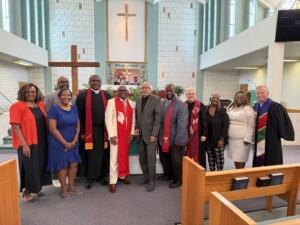Where’s Michael: September


First Christian Church, Broken Arrow

First Christian Church, Duncan

Village Christian Church, OKC and nesting New Vessels Christian Church

Patrick McKenzie (center red stole with dove) was ordained into Christian ministry at New Vessels Christian Church, August 24, 2025.
There’s a gathering of spirits
There’s a festival of friends
And we’ll take up where we left off
When we all meet again.Carrie Newcomer, “A Gathering of Spirits.” 2002.
Hello, Oklahoma Disciples. I trust you are well. Our Exec. Committee and Regional Board offer me a “Regional Minister’s Moment” at the meetings. An edited version of my August words are below. My September calendar is at the end of this post.
Each morning, I receive a pithy thought from a marketing guy named Seth Godin. He’s been in the business a long, long time. On August 6th, I received this thought.
The index is the search bar, the random access to the facts we can look up.
The table of contents, though, that’s a point of view. It’s a taxonomy of how to understand a complicated idea.
It’s the skeleton of the narrative and the pedagogy for learning.
We’re at risk of becoming all index.
The world could probably benefit from your table of contents.
If we imagine the Region as a little book, the title would be: Oklahoma Disciples Love and Serve Like Jesus. The table of contents: Connect, Equip, Empower. The index is full of lessons. There are more chapters to write about the relationships, mission, and ministry of our congregations and the Region as we live into a future that we trust to God’s knowledge and care, who in kind, trusts us with the message and ways of Jesus in our fragmented world. It won’t be easy, but the one we claim as Christ never said it would be. We won’t always get it right, but Jesus never said we would.
It’s been a busy first month as I’ve learned the back-of-the-house functions and processes that the Regional Minister manages. I’ve met with the Exec Committee, the Comm on Clergy Chair, the Regional Board, three congregations and their leaders imagining their future, and four of our five area minister groups. I attended my first Regional Ministers Zoom, where I met new colleagues, some I’ve known along the way, and many I’ll get to know and benefit from their experience and faith. Our General Minister and President, Rev. Terri Hord Owens, sends her “Hello and blessings.” to Oklahoma disciples.
All the things that I’ve observed over the years as an Associate when a new Regional Minister is called are happening. Phone calls, emails, and mail from congregations, clergy, and the General church, oh my. They are:
- Words of support and congratulations.
- Some are in personal or congregational distress and need to be heard, or are seeking prayer.
- Some are just curious if the new person will respond and how quickly.
- Invitations to fill the pulpit, to speak at a fellowship meal, visit the elders, or attend the next search committee meeting.
My time as Regional Minister begins with celebrations representing our congregations, denomination, and Christianity. On August 24th, the Church celebrated the ordination of Patrick McKenzie into Christian ministry at New Vessels Christian Church in Oklahoma City.
There are three installations this fall.
- September 14th, First Christian Church in Pond Creek celebrates Rev. Diane Morgan.
- September 28th, Southern Hills Christian Church in Edmond celebrates Rev. John Bain.
- October 12th, First Christian Church in Moore celebrates Rev. Matthew Ricks.
Four congregations have ministry anniversaries that we know of this fall.
- I’ll worship with First Christian Church in El Reno on Sept 7th for their 135th anniversary of ministry.
- Waukomis Christian Church celebrates 128 years of ministry on Sept 21st.
- I’ll offer words of welcome and encouragement at In the Spirit Christian Church in Tulsa on October 5th for their 17th anniversary of ministry.
- I’ll worship with First Christian Church in Tahlequah on October 19th for their 110th anniversary of ministry.
Celebrations. Did you see all the stories of ministry from this summer in the August Regional Roundup? If not, subscribe today. Some small changes are on the horizon for the Regional Roundup beginning in October.
The evening of October 5th, I’ll represent the Region at the inauguration of Rev. Dr. Douglas Powe as President of Phillips Theological Seminary.
The Oklahoma Disciples Foundation will celebrate 60 years of serving Oklahoma congregations on November 14th, and celebrate Rev. Kyle Maxwell for his years of service to the foundation and the Church. I look forward to attending, celebrating ODF’s work, and the ministry Rev. Maxwell. Equipping is an investment. The Oklahoma Disciples Foundation assists congregations and the Region with financial tools and endowment blessings from a cloud of witnesses committed to doing ministry and being gospel.
Equipping is an investment. That’s what the Comm for Children, Youth, and Young Adults does through summer camp, retreats, and the Regional Youth Council. The Comm on Laity is experimenting with digital continuing education this fall that will be offered “free of charge.” Learnings from this first step into digital continuing education will help plot a course for the Commission and for an Associate Regional Minister who will serve alongside the Commission on Laity and the CYYA to vision, create, and support intergenerational Christian education, life-long learning, and fellowship that empowers people to think, collaborate, dialogue, and act as followers of Jesus within the community of faith and as individuals beyond the walls or boundaries of the church. This is a missional ministry.
All of this and more, from the priorities of our budget to our care for our neighbor, congregations, and clergy could/can empower disciples to love and serve like Jesus, because followers of Jesus do Jesus like things. In our different contexts, I think that’s how we will recognize and measure goodness, mercy, and faithfulness, by what “we embrace, what we create, and who we include.” [Chocolat, (Miramax Films) 2000.]
I trust that God will continue to bless us with gospel to be and ministry to do in our congregations and through this covenant we claim and share: the Christian Church (Disciples of Christ) in Oklahoma. Thank you for reading.
Disciples, you are a blessing.
Where’s Michael? Connect with me through the usual channels: email, text, or phone. I appreciate your patience.
Regional Staff meet Monday’s, 10:30 am -11:00 am.
7: Preach @ FCC El Reno 135th Anniversary
8: Comm on Clergy Mtg (Zoom)
Yale Ave. Christian Church DCEF Mtg. (Zoom)
9: NEA Clergy Council (Zoom)
Central Area Clergy Mtg @ Southern Hills CC, Edmond
10: Regional Ministers Zoom
11: NWA Clergy Mtg @ Central CC, Enid
Exec. Comm Mtg (Zoom)
13: Regional Youth Council Planning Mtg (Zoom)
14: Worship @ FCC Pond Creek (Installation of Rev. Diane Morgan)
15: RA26 Planning Team (Zoom)
17: Regional Ministers Search & Call Zoom
18: Comm on Laity Mtg (Zoom)
20: CYYA Mtg (Zoom)
21-23: NWA Clergy Retreat @ Roman Nose St. Park
24: SE Area Clergy Mtg @ FCC Sulphur
28: Worship @ Southern Hills CC, Edmond (Installation of Rev. John Bain)
29: SW Area Clergy Mtg @ FCC Chickasha


